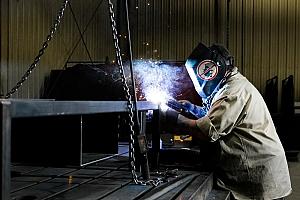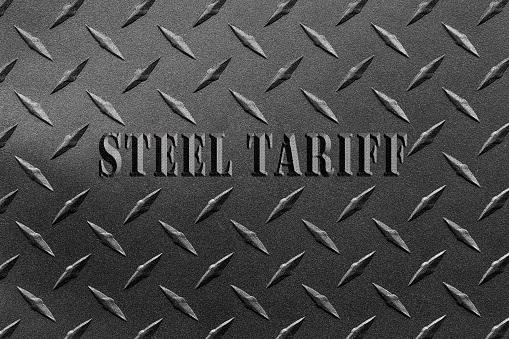Contributing Writer
- FMA
- The Fabricator
- FABTECH
- Canadian Metalworking
Categories
- Additive Manufacturing
- Aluminum Welding
- Arc Welding
- Assembly and Joining
- Automation and Robotics
- Bending and Forming
- Consumables
- Cutting and Weld Prep
- Electric Vehicles
- En Español
- Finishing
- Hydroforming
- Laser Cutting
- Laser Welding
- Machining
- Manufacturing Software
- Materials Handling
- Metals/Materials
- Oxyfuel Cutting
- Plasma Cutting
- Power Tools
- Punching and Other Holemaking
- Roll Forming
- Safety
- Sawing
- Shearing
- Shop Management
- Testing and Measuring
- Tube and Pipe Fabrication
- Tube and Pipe Production
- Waterjet Cutting
Industry Directory
Webcasts
Podcasts
FAB 40
Advertise
Subscribe
Account Login
Search
Commerce Department expands tariff exclusions
Manufacturers get a chance to rebut steel and aluminum industries’ objections
- By Stephen Barlas
- October 3, 2018
Responding to a great deal of criticism from both steel and aluminum importers and members of Congress from both parties, the Trump administration on Sept. 12 announced what it called responsive changes in the way the Commerce Department considers exclusion requests from companies looking to avoid the 25 percent and 10 percent import duties on steel and aluminum, respectively.
One of the major changes will allow applicants for exclusions to respond to U.S. steel and aluminum producers that oppose a particular exclusion request on the grounds that the particular grade of steel or aluminum is produced in sufficient quantity and grade by a U.S. manufacturer. Because the tariffs were imposed in March, companies such as U.S. Steel and Nucor have been able to quash many exclusion requests. Going forward, the applicant will be awarded a “rebuttal” period of seven days, which commences after the 30 days in which a U.S. producer can object to an exclusion request. Applicants will have to watch the Commerce Department website because the department will not be notifying applicants when the rebuttal period begins.
Commerce also drills down more deeply on definitions and in some instances provides examples. For example, some U.S. steel manufacturers have argued that an exclusion request should be denied because, even though the steel the applicant wants to import is not available in the U.S. in “satisfactory quality,” some “substitute” or “alternative” steel should be available that would suit the end use. The Commerce Department issued a statement saying that “substitute product” for purposes of this review criterion means that the steel being produced by an objector can meet “immediately” the quality (such as industry specs or a company’s internal quality controls or standards), regulatory, or testing standards. For example, if a U.S. company requires that steel plate must meet certain military testing and military specification standards in order to be used in military combat vehicles, that requirement would be taken into account when reviewing the exclusion request and any objections, rebuttals, and surrebuttals.As of Aug. 20, the Commerce Department had received more than 38,000 exclusion requests and more than 17,000 objections.
Tariffs Reduced for 1,600-plus Manufacturing Intermediates
Amidst all the stories about the increased tariffs on Chinese products, you would need a microscope to find any stories about the Miscellaneous Tariff Bill (MTB) Trump signed in mid-September. This bill reduced import tariffs on more than 1,600 raw materials used by U.S. manufacturers, many of them imported from China.
Before this announcement, U.S. Trade Representative Robert Lighthizer had issued two separate lists of Chinese products subject to 25 percent tariffs. (Each list comes from citing a separate provision of U.S. trade law.) The MTB allows companies importing any materials on either of those two lists to reduce the 25 percent tariff by whatever the MTB tariff reduction is. Those reductions, according to Patrick J. Togni, an associate in the international trade practice at King & Spalding LLP, range from low- to mid-single digits to 10 percent or more for certain tariff classifications. The reason for the variation is that the law says that the tariff reduction in each one of the 1,600-plus product categories cannot result in a loss of revenue to the U.S. of more than $500,000. So the tariff reductions are based on the dollar value amount of each product expected to be imported.
One of the significant aspects of the MTB is that any company importing any of the 1,600-plus products—again, many of them, though not all, from China—gets the tariff reduction, even though those Congress-approved reductions, were the result of a single U.S. company applying for the tariff relief.
“This could be a significant opportunity for many companies,” Togni said.
He also noted that the MTB is the first of two rounds that were authorized by Congress under the American Manufacturing Competitiveness Act of 2016. This first round of reductions expires Dec. 31, 2020. The second round of MTB must commence at the International Trade Commission no later than Oct. 15, 2019. Once that second MTB cycle starts, petitioners will be able to request extension of an existing duty suspension or reduction or ask for a new duty suspension or reduction.
U.S. Department of Commerce, www.commerce.gov
U.S. Trade Representative, https://ustr.gov
subscribe now

The Fabricator is North America's leading magazine for the metal forming and fabricating industry. The magazine delivers the news, technical articles, and case histories that enable fabricators to do their jobs more efficiently. The Fabricator has served the industry since 1970.
start your free subscriptionAbout the Author

Stephen Barlas
- Stay connected from anywhere

Easily access valuable industry resources now with full access to the digital edition of The Fabricator.

Easily access valuable industry resources now with full access to the digital edition of The Welder.

Easily access valuable industry resources now with full access to the digital edition of The Tube and Pipe Journal.
- Podcasting
- Podcast:
- The Fabricator Podcast
- Published:
- 04/30/2024
- Running Time:
- 53:00
Seth Feldman of Iowa-based Wertzbaugher Services joins The Fabricator Podcast to offer his take as a Gen Zer...
- Industry Events
Pipe and Tube Conference
- May 21 - 22, 2024
- Omaha, NE
World-Class Roll Forming Workshop
- June 5 - 6, 2024
- Louisville, KY
Advanced Laser Application Workshop
- June 25 - 27, 2024
- Novi, MI
Precision Press Brake Certificate Course
- July 31 - August 1, 2024
- Elgin,
































